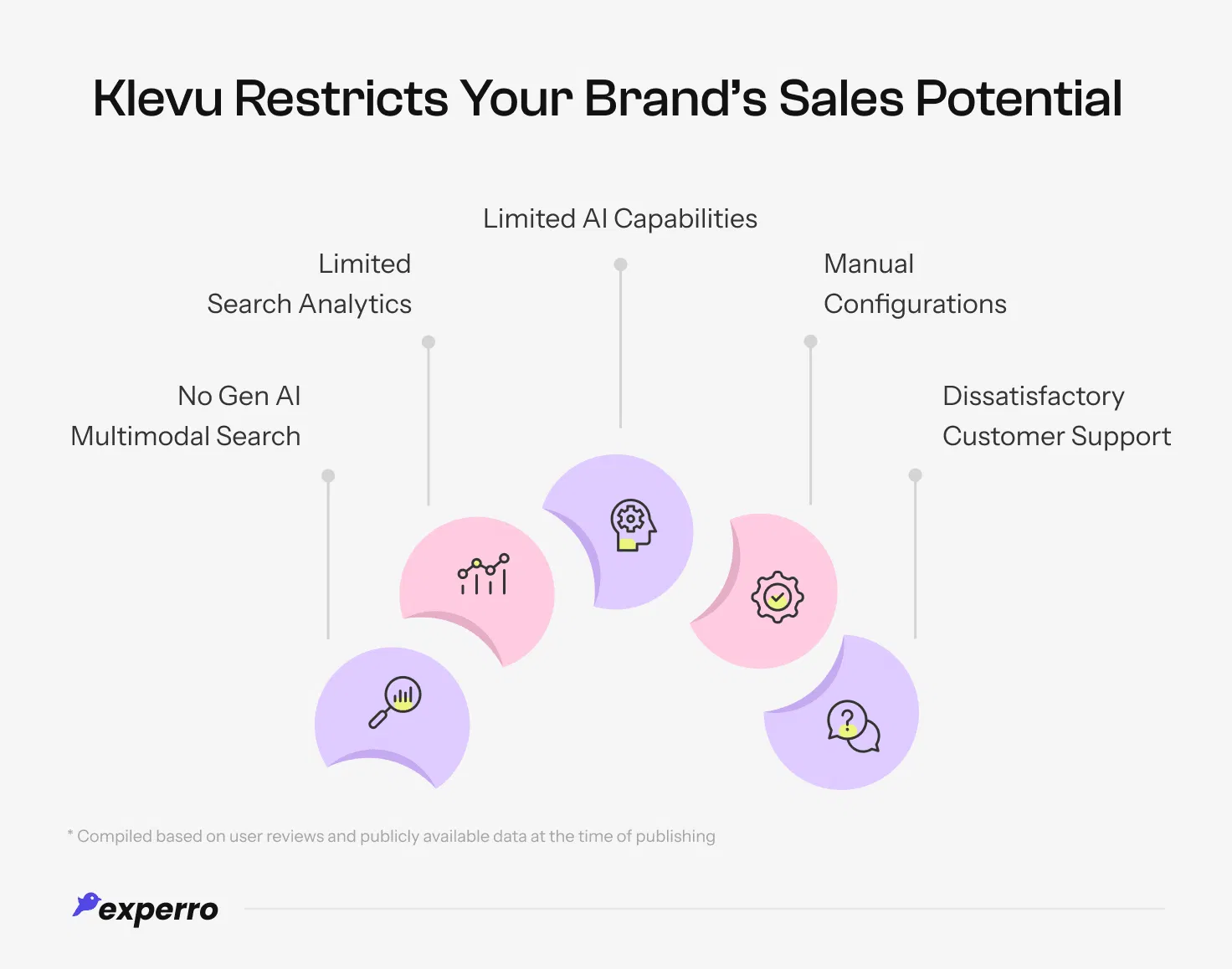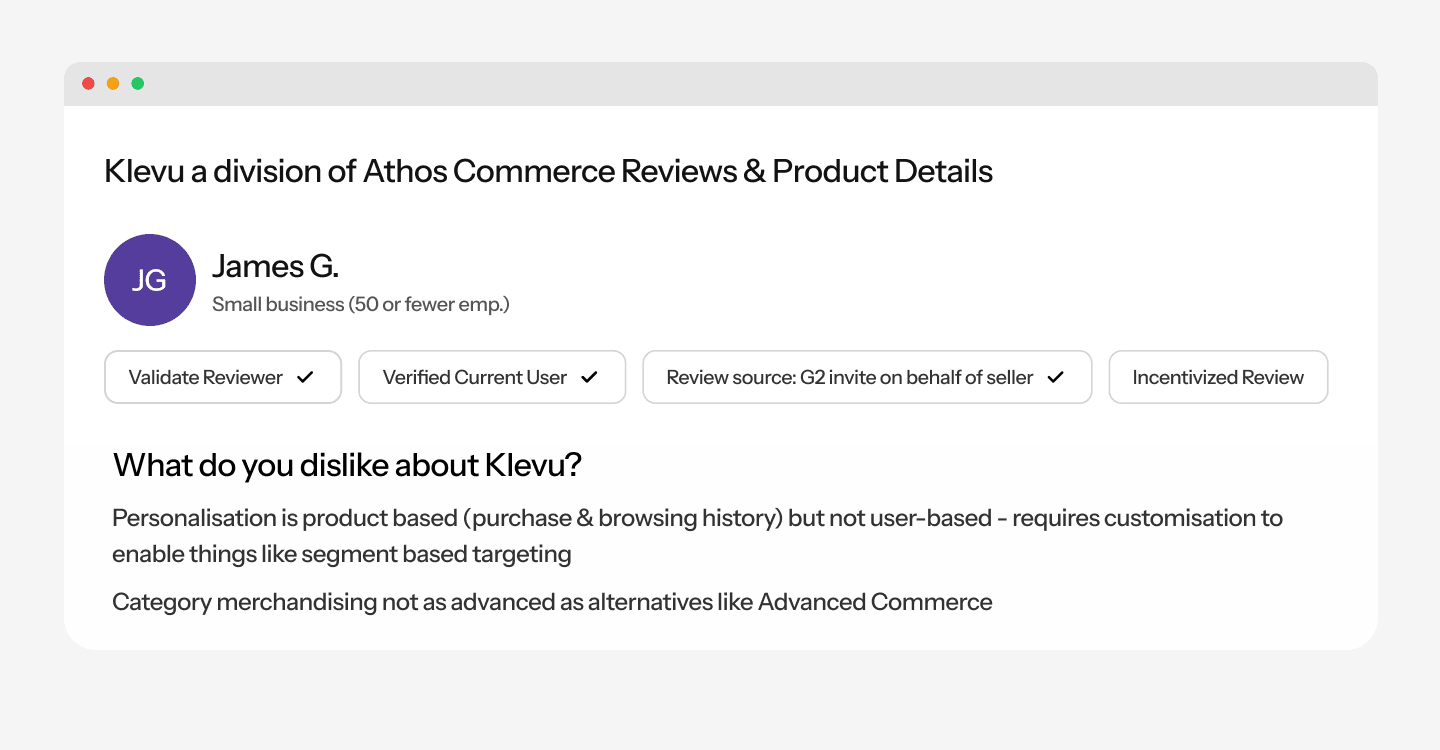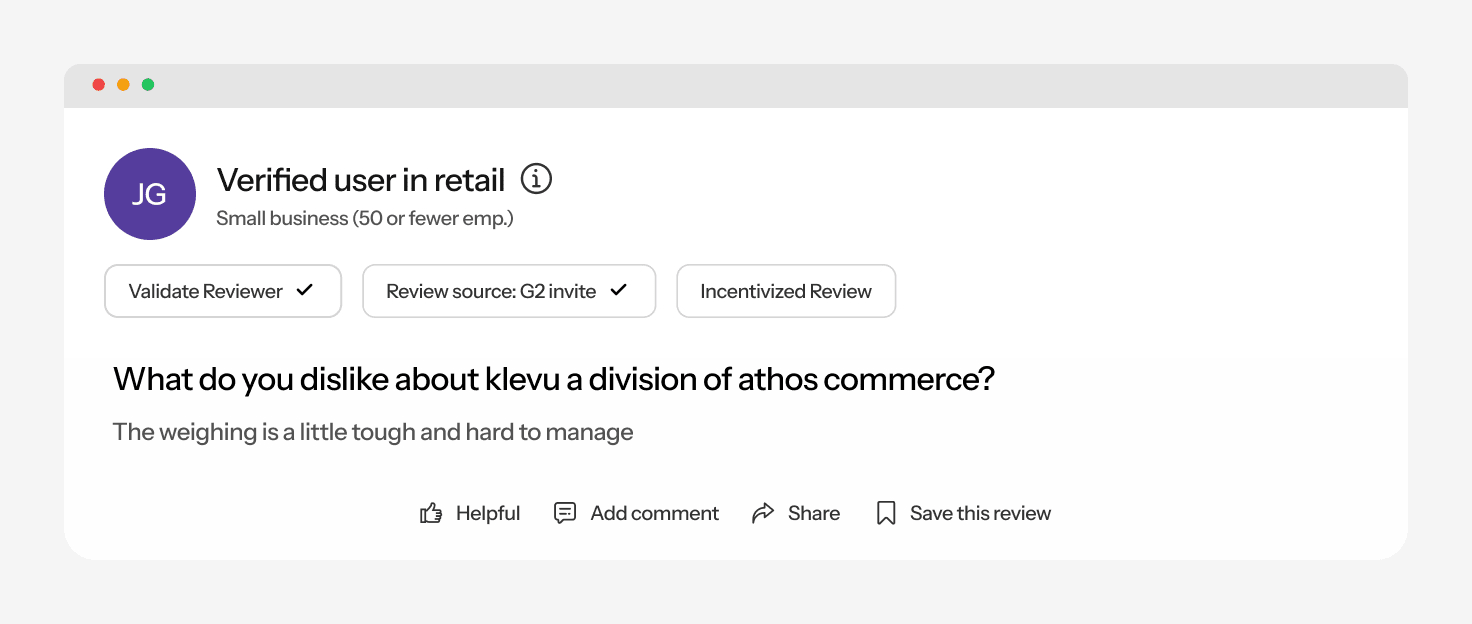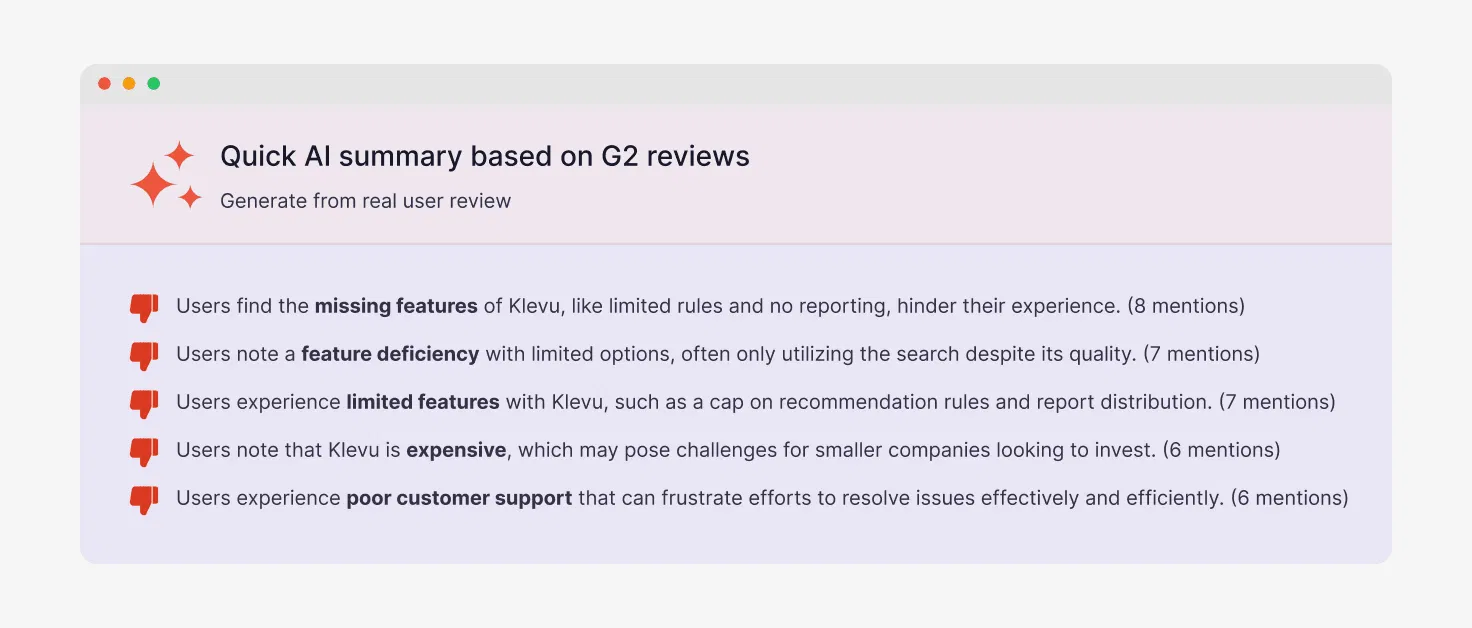Disclaimer: The information in this article is based on publicly available sources, user reviews, and our own research at the time of writing. It is intended for educational and informational purposes only. We encourage businesses to independently evaluate solutions to determine the best fit for their needs. This article was last updated on 5th September 2025 as part of our routine maintenance on the basis of newly available information.
core insights box
- Klevu users report that personalization feels more rule-based compared to newer AI-driven approaches, which may not meet every retailer’s personalization needs.
- eCommerce businesses looking for speed, intelligence, and no-code flexibility are exploring alternatives to Klevu after its acquisition by Searchspring and rebrand under Athos Commerce.
- Experro emerges as the top Klevu alternative with native generative AI search capabilties, visual merchandising, and real-time 1-on-1 personalization.
If you’ve been relying on Klevu for product discovery, merchandising, or AI search, their recent merger might have left you wondering what’s next.
Whether it’s limited AI capabilities or a complicated UI, many eCommerce businesses are searching for better search engine than Klevu and Searchspring to future-proof their store.
So if you're asking, “What to use instead of Klevu?” - you are in the right place!
From performance to personalization capabilities, we’ve broken down the best alternatives to Klevu in 2025. Among them, Experro seems to be a strong Klevu replacement, offering features like native generative AI search, real-time personalization, and visual merchandising.
What Klevu Couldn't Do for Merchandisers?

While Klevu has served many brands in the past, it misses the mark on several essential features modern retailers can’t ignore:
1. Lack of Gen AI Multimodal Search
Users miss the key features that are a must in an eCommerce platform. Users express their concerns on G2 that Klevu lacks Gen AI-powered multimodal search capabilities.1
A product search and discovery should work seamlessly in the time when customers particularly want the platform to understand their search query intents.
Here, Experro wins over in this battle as it provides vector search, multimodal search, and smart search that actually understands customer intents.
2. Limited Search Analytics
According to user feedback, Klevu’s analytics are perceived as limited, offering less depth than some competitors’ real-time reporting. 3
This lack of depth makes it hard to make data-backed decisions that could improve conversions and product discovery. Limited analytics can make it harder to measure and act on key insights, which some retailers see as a disadvantage in a competitive market.
Hence, Experro's merchandising intelligence comes to the rescue! It offers in-depth predictive insights, helps save hours with smarter merchandising, and also gives helpful profit signals all-in-one!
3. Limited Gen AI Capabilities
Klevu does not currently advertise features such as native generative AI, conversational agents that can aid customers.
Some users report experiencing missed matches and irrelevant results on long-tail or vague queries, which also impacts product discovery.
On the other hand, Experro avoids such customer frustration by providing conversational AI agent that helps shoppers find the right products with smart, human-like support 24x7.
4. Time-Consuming Manual Configurations
Some reviewers note reliance on developer support for making changes, which can slow down marketing and merchandising teams. This makes it harder for them to act independently.
If your store needs speed, hyper-personalization, and powerful merchandising without developer dependency, you’ll need a Klevu substitute that delivers more such as Experro.
5. Dissatisfying Customer Support
Multiple reviewers mention that the representatives at Klevu are very eager to close the tickets without proper resolution of their problems. 4
Now this is a problem that an Experro user would never face because we have dedicated teams that are always at their toes to serve the client in various time zones. We are not eager to close the tickets but are particularly eager to serve our users and help them with quick and effective solutions.
Now, let's explore what the users exactly say about Klevu in the next section.
"Is Klevu Living Up to Expectations?" See What Users Say
Customer feedback from trusted platforms like G2 and TrustRadius paints a clear picture as many users are frustrated by Klevu’s technical complexity, limited AI capabilities, and lack of flexibility.
These recurring concerns reflect deeper issues that cannot be ignored. Let’s explore some.
1. What Do Klevu Users Say in G2 Reviews?

Source: G2 reviews
A G2 review reveals that Klevu’s personalization and category merchandising require heavy customization, lacking true AI adaptability for real-time targeting that Experro offers.
2. What Do Customers Dislike About Klevu on G2?

Source: G2 reviews
Another retail user on G2 shares that Klevu’s interface and weighing system are difficult to navigate and manage effectively.
3. What Does G2’s AI-Generated Summary Say for Klevu?

Source: G2's AI Summary About Klevu
This summary from G2 highlights common customer complaints about Klevu, including limited features, high pricing, poor support, and a lack of advanced AI capabilities, all based on real user reviews.
And now, the recent Athos Commerce's acquisition of Klevu and Searchspring has added a new layer of complexity. So, what does this mean for existing users? Let’s explore in the next section.
What Is the Impact of Athos Commerce on Klevu and Searchspring Users?
Searchspring, a previous competitor of Klevu and owned by private-equity, acquired Klevu in January 2025, and now they are being merged into Athos Commerce. 5
Klevu's founding team and employees have moved out post-acquisition. Also, the customers will be migrated to the Athos Commerce platform in the future. 6
For businesses that are looking to improve sales, they should look for a more stable and future-proof platform that gives them an edge with Gen AI search, prepares them for the age of AI Agents, real-time 1-on-1 personalization, in-depth merchandising insights instead of getting stuck in the transition.
Experro can help businesses move forward confidently without the risks of any mergers or acquisitions and with a clearer roadmap full of advanced capabilities.
Now, let’s compare Klevu with some alternatives in the market to help you find the best solution for your e-store.
The Ultimate Comparison of Klevu Alternatives
With so many Klevu competitors and alternatives, it’s tricky to figure out which one delivers.
We've done the hard work for you - here’s a breakdown of alternatives so you can find the best replacement for Klevu that suits your business needs.
| Platform | Pricing | G2 Rating | Free Trial | Best For? |
|---|---|---|---|---|
| Experro 🏆 | Flexible, scalable plans with a free demo | 4.8/5 (20 badges in Summer 2025, 19 in Winter 2025) | Yes (free trial) | Mid‑to‑enterprise brands needing unified AI search & personalization |
| Algolia | Free: 10k searches/month; “Grow” ~ $51/mo for extra requests | 4.5/5 | Yes (free tier + paid trial) | Developers & merchandisers needing fast, API-first AI search solutions |
| Searchanise | 7 tiers (Free to ~$329/mo); 14-day trial on paid plans | 4.7/5 | Yes (free plan + trial) | Budget-conscious SMBs wanting quick, simple e‑commerce search |
| Doofinder | $39/mo (Basic), $59/mo (Pro), $129/mo (Advanced); 30-day free trial | 4.7/5 | Yes (30-day trial/free version) | Stores needing fast AI search, real-time indexing, analytics |
| Bloomreach | Enterprise pricing (custom quotes) | 4.3–4.8/5 | Yes (trial/free version) | Large enterprises needing deep data integration, complex personalization |
* Comparison displayed on the basis of user reviews and publicly available data at the time of publishing
Here’s a closer look at top Klevu alternatives, from well-known names to emerging platforms built for performance and personalization.
1. Experro

Experro positions itself as a strong alternative to Klevu, designed for speed, intelligence, and control.
It offers Gen AI-powered search, real-time behavior-aware personalization, and agentic experiences to elevate every customer interaction.
What makes Experro stand out is its built-in digital merchandising and real-time predictive customer analytics, enabling teams to optimize product discovery without relying on developers.
Entrepreneurs can easily manage search rules, ranking strategies, and product placements through its in-built eCommerce merchant intelligence software.
Whether you're using Shopify, BigCommerce, or a home-grown solution, Experro integrates smoothly, making it a future-ready alternative to Klevu Search engine.
Pros of Experro | Cons of Experro |
|---|---|
✅ Multimodal Search Compatibility | ❌ Not found any |
✅ Intelligent Gen AI-powered Recommendations | |
✅ Experience platform with Conversational AI Agent | |
✅ Gen AI-based merchandising engine | |
✅ AI-driven 360° product view | |
✅ Control Over Search Relevance | |
✅ Lightning-Fast Page Load Speeds | |
✅ GDPR & CCPA Compliance |
Curious how Experro outperforms Klevu? Dive into the full comparison guide!
2. Algolia

Algolia is a popular alternative to Klevu AI search known for its impressive speed and scalability.
It offers a robust set of APIs that developers can use to build highly personalized search experiences. However, it requires extensive developer input for setup, tuning, and ongoing maintenance.
Personalization features are limited and mostly rule-based, and there’s no built-in visual merchandising or native AI layer.
For non-technical teams, making changes or optimizing search can be challenging without developer support. Many businesses keep exploring Algolia alternatives that offer more control and easier usability.
| Pros of Algolia | Cons of Algolia |
|---|---|
| ✅ Fast search speed | ❌ Lacks built-in AI personalization |
| ✅ Flexible with APIs | ❌ Merchandising tools not included |
| ❌ Requires technical teams to manage | |
| ❌ Add-ons increase overall cost |
Want to know how Experro outshines Algolia in search and discovery capabilities? Check out the head-to-head comparison!
3. Searchanise

Searchanise is one of the popular Klevu alternatives often favored by small to mid-sized eCommerce stores.
It’s known for being budget-friendly and easy to install across platforms like Shopify and BigCommerce. However, it's primarily rule-based and lacks the intelligence needed for larger, fast-scaling operations.
The search experience is fairly basic, and there's no support for the key features for modern shopping journeys like visual merchandising or real-time personalization.
| Pros of Searchanise | Cons of Searchanise |
|---|---|
| ✅ Easy to install | ❌ Poor Personalization |
| ✅ Cost-effective | ❌ Basic analytics |
| ❌ No visual merchandising capabilities | |
| ❌ No advanced AI or generative search | |
| ❌ Not suitable for scaling brands |
4. Doofinder

Doofinder is a lightweight Klevu search alternative that focuses on delivering fast search results with a straightforward setup. It’s often chosen by stores that want a plug-and-play solution with minimal configuration.
While it offers decent performance for basic use cases, it lacks the depth needed for behavioral personalization, dynamic merchandising, or scalable AI. It's more of a short-term fix than a long-term strategy.
| Pros of Doofinder | Cons of Doofinder |
|---|---|
| ✅ Simple setup | ❌ AI capabilities are limited |
| ✅ Affordable pricing | ❌ Weak analytics |
| ❌ Lacks advanced merchandising tools | |
| ❌ Rule-based personalization |
5. Bloomreach

Bloomreach is an enterprise-level Klevu competitor offering advanced site search, personalization, and content tools. It's well-suited for large, data-rich enterprises with the tech resources to manage it.
Despite its power, Bloomreach often proves too complex and costly for mid-market brands. The onboarding and integration process can be lengthy, with a steep learning curve for teams.
| Pros of Bloomreach | Cons of Bloomreach |
|---|---|
| ✅ Enterprise-ready | ❌ Long implementation times |
| ✅ Advanced data segmentation | ❌ Steep learning curve |
| ❌ High cost of ownership |
You have found your Klevu replacement!
Final Thoughts
If you’re planning a shift from Klevu, don’t settle for less. Look for a platform like Experro that not only replicates Klevu’s capabilities but goes beyond, i.e. delivers faster search, smarter personalization, and visual control.
Experro positions itself as a leading alternative to Klevu for 2025 and beyond, offering advanced capabilities across search, personalization, and merchandising.
Schedule a call with our experts for a personalized walkthrough and migration plan.
Sources:
6 - Blog by Klevu
FAQs
What are the best site search alternatives to Klevu for AI-powered search?
The best Klevu alternatives include:
- Experro
- Algolia
- Searchanise
- Doofinder
- Bloomreach.
Among these, Experro stands out with native generative AI and real-time personalization among many other built-in capabilities.
What powerful features should I look for in a Klevu alternative?
eCommerce brands should look for:
- Real-time personalization
- Generative AI
- Built-in merchandising tools
- eCommerce analytics
- Ease of use.
Also, Experro is the only platform checks all the boxes.
Does Experro support Shopify or BigCommerce like Klevu did?
Yes, Experro supports Shopify, BigCommerce, and Magento, along with headless commerce architectures, offering seamless and flexible plug-and-play integrations for all.
What makes Experro better than Klevu, Searchspring, or AthosCommerce?
Experro is the only eCommerce experience platform that offers native Generative AI, faster deployment, real-time personalization, and a visual merchandising studio. These are some of the features that many Klevu search competitors lack.
How long does it take to go live with Experro?
You can go live in as little as 2–4 weeks, depending on your existing tech stack, website complexity, and data readiness.
Experro offers end-to-end onboarding support, including integration assistance, design configuration, product data setup, and training, ensuring a smooth and speedy launch tailored to your business needs.
Does Experro offer a free trial or onboarding support for Klevu users?
Yes, Experro offers free trial and an onboarding support and personalized migration for users seeking a Klevu exit alternative.
Pallavi Dadhich
Content Writer @ ExperroPallavi is an ambitious author recognized for her expertise in crafting compelling content across various domains. Beyond her professional pursuits, Pallavi is deeply passionate about continuous learning, often immersing herself in the latest industry trends. When not weaving words, she dedicates her time to mastering graphic design.
What's Inside
- What Klevu Couldn't Do for Merchandisers?
- "Is Klevu Living Up to Expectations?" See What Users Say
- What Is the Impact of Athos Commerce on Klevu and Searchspring Users?
- The Ultimate Comparison of Klevu Alternatives
- Final Thoughts
Subscribe to Our Newsletters
Get the latest insights delivered straight to your inbox.



